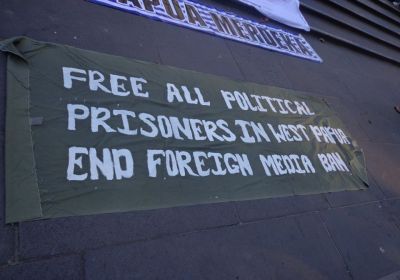
-
 "After international pressure, today the Indonesian President has claimed that all foreign journalists are now free to report in West Papua without travel restrictions,” the BBC reported on May 11. “This is historic news as for 50 years the Indonesian government has banned foreign journalists from entering West Papua." A global day of action on April 29 featured protests in several cities that called on the Indonesian government to allow free and open access into occupied West Papua for international journalists, humanitarian agencies and human rights groups.
"After international pressure, today the Indonesian President has claimed that all foreign journalists are now free to report in West Papua without travel restrictions,” the BBC reported on May 11. “This is historic news as for 50 years the Indonesian government has banned foreign journalists from entering West Papua." A global day of action on April 29 featured protests in several cities that called on the Indonesian government to allow free and open access into occupied West Papua for international journalists, humanitarian agencies and human rights groups. -
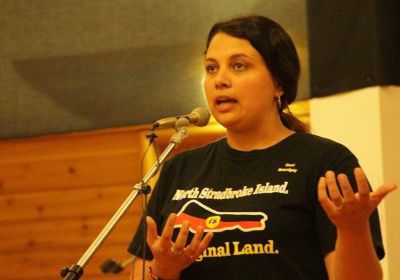 The Aboriginal Provisional Government (APG) made the following media release on May 12, 2015. * * * APG diplomat Pekeri Ruska (Goenpul/Yuggera) was harassed and threatened by customs officials at Brisbane international airport this afternoon after presenting only her Aboriginal passport which had been stamped on entry and exit from Honiara, Solomon Islands.
The Aboriginal Provisional Government (APG) made the following media release on May 12, 2015. * * * APG diplomat Pekeri Ruska (Goenpul/Yuggera) was harassed and threatened by customs officials at Brisbane international airport this afternoon after presenting only her Aboriginal passport which had been stamped on entry and exit from Honiara, Solomon Islands. -
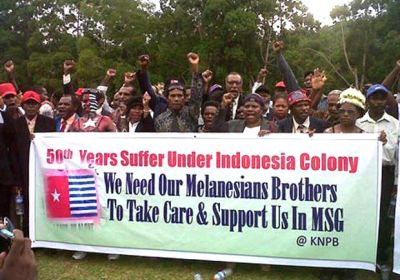 The brutal determination of Indonesian President Joko Widodo to kill two Australian citizens comes as no surprise to West Papuan independence activists, who say they share Australia's pain. A West Papuan independence activist, who has been in exile for 12 years after escaping the Indonesian-controlled province, has called on the Australian government to look on “in sympathy [and] in pain” for his own people, who are being “killed like animals” after the execution of two Australians.
The brutal determination of Indonesian President Joko Widodo to kill two Australian citizens comes as no surprise to West Papuan independence activists, who say they share Australia's pain. A West Papuan independence activist, who has been in exile for 12 years after escaping the Indonesian-controlled province, has called on the Australian government to look on “in sympathy [and] in pain” for his own people, who are being “killed like animals” after the execution of two Australians. -
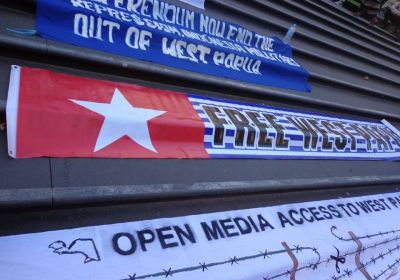 A global day of action on April 29 involved protests in several cities to call on the Indonesian government to allow free and open access into occupied West Papua for international journalists, humanitarian agencies and human rights groups. Melbourne rally co-organiser said Matt Gale said: “West Papua is one of the world’s most isolated conflict spots. For decades, indigenous activists campaigning for their rights have been arrested, disappeared, tortured and killed.
A global day of action on April 29 involved protests in several cities to call on the Indonesian government to allow free and open access into occupied West Papua for international journalists, humanitarian agencies and human rights groups. Melbourne rally co-organiser said Matt Gale said: “West Papua is one of the world’s most isolated conflict spots. For decades, indigenous activists campaigning for their rights have been arrested, disappeared, tortured and killed. -
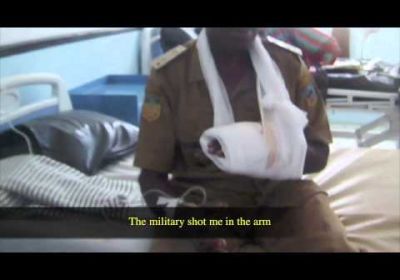
A video released by Minority Rights Group on April 8 shows the aftermath of the “Paniai massacre” in West Papua in December last year, bringing to light Indonesia's human rights abuses.
-
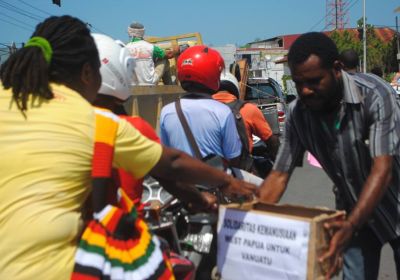 This statement was released by Benny Wenda, Spokesperson for the United Liberation Movement for West Papua, on March 21. *** It brings me much sadness and grief to report that 2 days ago on March 19, 4 more of my people were shot by the Indonesian police. One was killed and at least 3 more were arrested, all simply for attending a peaceful fundraiser in Yahukimo, West Papua.
This statement was released by Benny Wenda, Spokesperson for the United Liberation Movement for West Papua, on March 21. *** It brings me much sadness and grief to report that 2 days ago on March 19, 4 more of my people were shot by the Indonesian police. One was killed and at least 3 more were arrested, all simply for attending a peaceful fundraiser in Yahukimo, West Papua. -
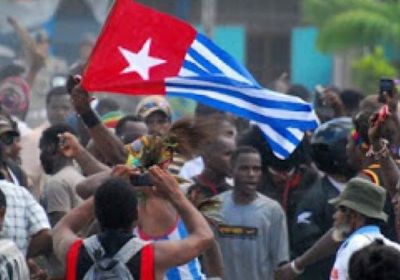 The statement below was released on the Facebook page of the Free West Papua Campaign. *** We are filled with grief today to learn that a 17-year-old West Papuan youth has been found murdered by suspected members of the Australian-trained Indonesian special forces group Kopassus.
The statement below was released on the Facebook page of the Free West Papua Campaign. *** We are filled with grief today to learn that a 17-year-old West Papuan youth has been found murdered by suspected members of the Australian-trained Indonesian special forces group Kopassus. -
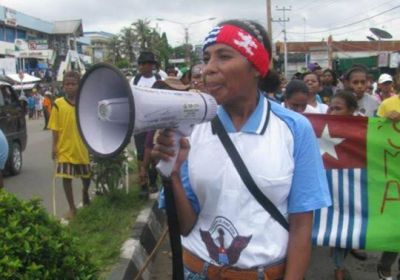 Indonesia is supposed to have a new liberal leadership with the election of new president Jodo Widodo, the first president since the Suharto dictatorship was overthrown in 198 to be elected from outside the Javanese military/political elite. But the Australian public, in the furore over the fate of two the Australians and others facing execution, are getting a glimpse of the stance of Widodo — and other influential Indonesian leaders — towards human rights, justice and compassion.
Indonesia is supposed to have a new liberal leadership with the election of new president Jodo Widodo, the first president since the Suharto dictatorship was overthrown in 198 to be elected from outside the Javanese military/political elite. But the Australian public, in the furore over the fate of two the Australians and others facing execution, are getting a glimpse of the stance of Widodo — and other influential Indonesian leaders — towards human rights, justice and compassion. -
West Papua independence leader Benny Wenda has launched an urgent appeal to help those affected by Cyclone Pam which has caused much loss of life and destruction throughout many Pacific nations. “I urgently need help for my Brothers and Sisters in the Pacific particularly in Vanuatu and other islands who have lost everything due to the cyclone disaster we have all seen on the TV news," Wenda, the Spokesperson for the United Liberation Movement of West Papua, said.
-
 On February 4 a coalition uniting the resistance of Indonesian-occupied West Papua submitted an application to join the Melanesian Spearhead Group (MSG).
On February 4 a coalition uniting the resistance of Indonesian-occupied West Papua submitted an application to join the Melanesian Spearhead Group (MSG). -
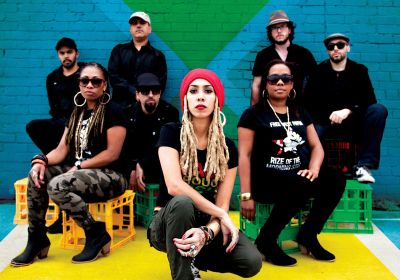
Blue King Brown (pictured) are back on tour in January to promote their new album Born Free and just generally to spread the love with their fans. The album, which was released in November, is a cutting-edge roots selection of tracks centred around the message of internationalism and the people of the world coming together to support social justice.
-
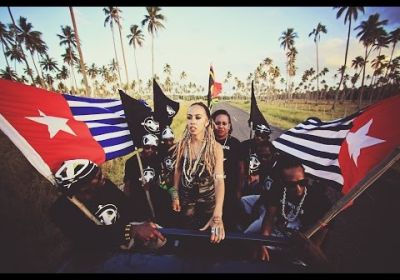
Australian urban roots and reggae band Blue King Brown have joined musicians, artists and writers using their artistic talents to expose the political fraud and brutal genocide that the Indonesian government has committed against the West Papuan people.